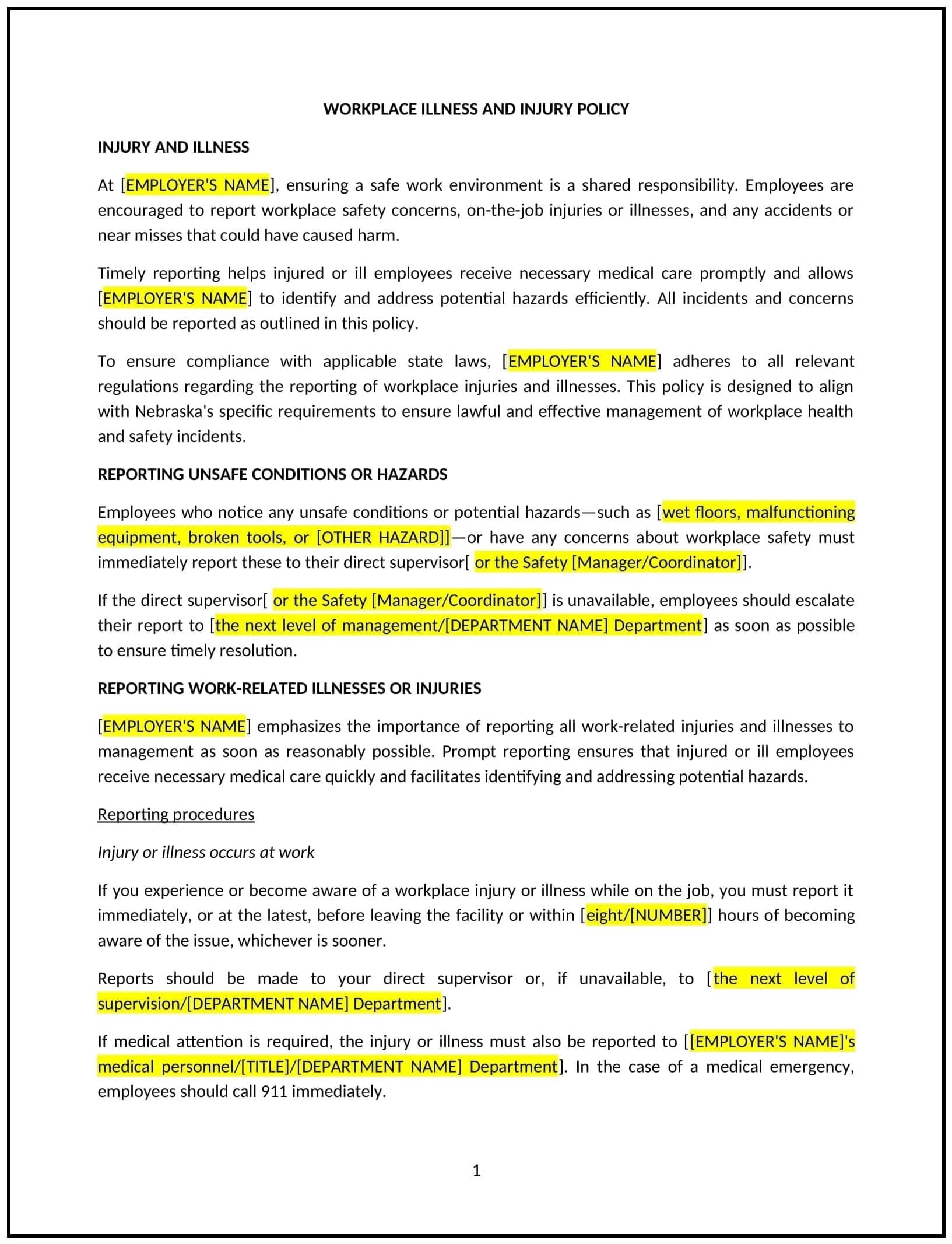Workplace illness and injury policy (Nebraska): Free template
Got contracts to review? While you're here for policies, let Cobrief make contract review effortless—start your free review now.

Customize this template for free
Workplace illness and injury policy (Nebraska)
A workplace illness and injury policy helps Nebraska businesses protect their employees by establishing clear guidelines for handling workplace illnesses, injuries, and accidents. This policy outlines the steps employees should take when they become ill or injured at work, how the company will manage such incidents, and the procedures for reporting and responding to these situations. It is designed to create a safe and supportive work environment while ensuring that both the employee and employer understand their rights and responsibilities.
By adopting this policy, businesses in Nebraska can reduce the risk of workplace injuries, ensure that employees have access to necessary medical care, and foster a culture of safety and well-being.
How to use this workplace illness and injury policy (Nebraska)
- Define workplace illnesses and injuries: Clearly define what constitutes a workplace illness or injury, including physical injuries, illnesses caused by exposure to workplace hazards, and mental health issues arising from the work environment. Include any conditions or illnesses related to the workplace environment or job tasks.
- Outline the reporting process: Employees should immediately report any illness or injury that occurs at work to their supervisor or HR department. The policy should specify the preferred method of reporting (e.g., in writing, via a dedicated form, or verbally) and the timeframe within which reports should be made.
- Establish medical treatment procedures: Define the procedures for seeking medical treatment after a workplace injury or illness, including whether employees are required to visit a specific medical provider or if they are free to seek treatment from their preferred healthcare provider. Include information on workers’ compensation and how it applies to workplace injuries.
- Clarify return-to-work procedures: Outline the process for employees returning to work after an illness or injury, including whether they need a doctor’s note or clearance to return to their regular duties. Specify any accommodations or modifications that may be available to employees during their recovery.
- Address paid vs. unpaid leave: Specify whether employees will receive paid leave for illnesses or injuries sustained at work or if they are required to use PTO, sick leave, or take unpaid time off. Include guidelines for workers' compensation leave, if applicable, and how it interacts with other forms of leave.
- Provide support for recovery: Offer resources or assistance to employees recovering from workplace injuries or illnesses, such as access to counseling, rehabilitation, or ergonomic assessments. Ensure that employees feel supported during their recovery process and are aware of any resources available.
- Document illness and injury incidents: Ensure that all workplace illnesses and injuries are documented thoroughly, including details of the incident, medical treatment, and any follow-up actions. This helps protect both the employee and the business in case of disputes or claims.
- Review and update: Regularly review and update the policy to reflect changes in Nebraska state laws, industry best practices, or the company’s evolving needs. This ensures that the policy remains relevant and compliant with any legal requirements.
Benefits of using this workplace illness and injury policy (Nebraska)
This policy provides several benefits for Nebraska businesses:
- Protects employee health and safety: By outlining clear guidelines for handling workplace illnesses and injuries, businesses can better protect their employees from harm and address incidents quickly and efficiently.
- Reduces workplace risks: Having a structured policy in place helps businesses proactively reduce the likelihood of illnesses and injuries by promoting safety standards and encouraging employees to report hazards or unsafe practices.
- Ensures legal protection: A clear policy helps businesses comply with state and federal regulations, including workers’ compensation laws, reducing the risk of lawsuits or fines related to workplace injuries or illnesses.
- Supports employee well-being: By providing a process for managing workplace illnesses and injuries, businesses demonstrate their commitment to employee health, which can improve morale, trust, and overall job satisfaction.
- Improves operational efficiency: A well-defined policy for managing illness and injury incidents ensures that the business can maintain productivity and minimize disruptions, even when employees need time off to recover.
Tips for using this workplace illness and injury policy (Nebraska)
- Communicate the policy clearly: Ensure that all employees are familiar with the workplace illness and injury policy, including how to report incidents and the resources available to them. Include the policy in employee handbooks, onboarding sessions, and internal communications.
- Train employees on safety procedures: Regularly provide safety training and awareness programs to help employees avoid workplace injuries and illnesses. This may include training on proper lifting techniques, using protective equipment, or handling hazardous materials.
- Encourage prompt reporting: Employees should be encouraged to report any injuries or illnesses as soon as they occur to ensure that the company can take appropriate action and prevent further harm.
- Monitor employee recovery: Follow up with employees who are recovering from an illness or injury to ensure they have the support they need to return to work safely and effectively. Offer accommodations if necessary to help employees transition back to their regular duties.
- Document all incidents: Maintain detailed records of all workplace illness and injury incidents, including the cause, treatment, and any follow-up actions. This documentation will be useful for future reference and in case of any legal or workers’ compensation claims.